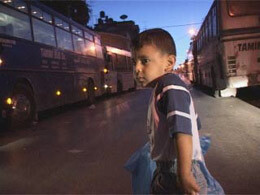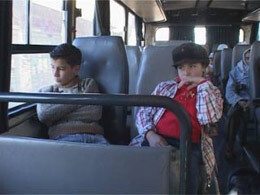B'Tselem 26 October 2006

Four-year-old boy travels alone to visit his father imprisoned in Israel. (B’Tselem)
Holding these prisoners and detainees in Israel flagrantly breaches international humanitarian law, which prohibits the transfer of civilians, including detainees and prisoners, from the occupied territory to the territory of the occupying state. Israel’s disregard for this prohibition is one of the main reasons that the prisoners and their families are unable to exercise their right to visits in a reasonable manner.
This report sheds light on the many difficulties and the suffering faced by the prisoners’ families, residents of the West Bank and the Gaza Strip, in their efforts to visit their relatives imprisoned in Israel.
Although Israel has the obligation to enable residents of the Occupied Territories to exercise their right to visit their relatives imprisoned in Israel, the task has been performed, since 1969, by the International Committee of the Red Cross. Relatives from the Occupied Territories who want to visit can do so only on the designated visiting days and on the transportation that the ICRC organizes, provided they received the relevant permit from the Israeli military authorities.
Because of the obstacles entailed in obtaining a permit to enter Israel, many Palestinians are able to visit their imprisoned relatives only once every few months. Many others are denied a permit and are thus unable to visit at all. In addition, the visit itself entails a grueling journey that can take almost 24 hours because of the checks and delays.

‘Udai and Sabrin on their way to vist one of their brothers. (B’Tselem)
In light of the report’s findings, B’Tselem urges the government of Israel to transfer all Palestinian prisoners to detention facilities inside the Occupied Territories. If the transfer requires the building of new facilities, Israel must ensure that it constructs the facilities while respecting the rights of the residents of the Occupied Territories, in particular their property rights.
Also, so long as Palestinians are held inside Israel, B’Tselem calls on the government of Israel to:
Related Links